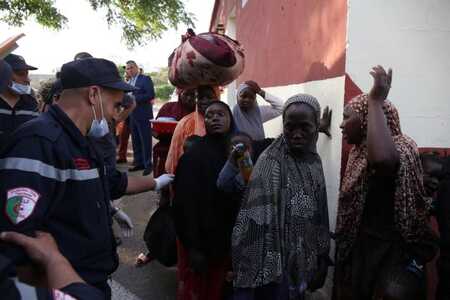Regular mass deportations from Algeria to Niger continue unabated. With at least 1040 people deported in a large unofficial deportation convoy on 12th of November, at least 456 people deported in an official convoy on 14th of November, at least 100 people deported in an unofficial convoy on 19th of November and at least 690 people deported in an official convoy on 21st of November the number of people deported since the beginning of the year 2021 amounts to at least 22127 people.

Photo source: middle east monitor (September 2019)
The deportations are taking place in violent conditions of disregard for human beings, often putting the lives of those deported at risk. In Niger, one of the poorest countries in the world, many deported people are stranded in miserable conditions in Agadez and other towns in the country.
At the same time, deportees who are not Nigerien citizens report being harassed and fined by the Niger police because they do not have a residence permit in Niger.
Unofficial deportation convoys on 12th and 19th of November 2021
According to observations by Alarme Phone Sahara whistleblowers, 1040 people, including 9 women, deported from Algeria in an "unofficial" deportation convoy arrived on foot at the Assamaka border post on 12th of November 2021. The largest groups of deportees were nationals of Mali, numbering 287, Guinea Conakry, 371, and Chad, 201. Alongside them, there were also nationals from many sub-Saharan African countries: 29 from Sierra Leone, 40 from Ivory Coast, 32 from Cameroon, 19 from Benin, 15 from Senegal, 18 from the Gambia, 8 from Nigeria, 8 from Guinea Bissau, 6 from Liberia, two from Somalia and one each from the Congo, Ghana, Central African Republic and Eritrea.
Another 100 deportees in an "unofficial" convoy, including two women, arrived on foot at the Assamaka border post on 19 November 2021. Among them were 40 nationals from Guinea Conakry, plus 14 nationals from Sudan, 13 from Benin, 7 from Sierra Leone, 6 from Mali, 5 from Ivory Coast, 4 from Nigeria, 4 from Togo, 3 from Cameroon, 2 from Liberia, one person from Senegal and one from Chad.
Regularly, people from the "unofficial" expulsion convoys are left in the border area between Algeria and Niger, in the middle of the desert. With this practice, the Algerian security forces always put the lives of the deportees at risk: The deportees have to walk between 15 and 20 kilometres through the desert in order to reach Assamaka, the first Nigerien village after the Algerian border. Starving, dehydrated, it is feared that many will not make it if they get lost in the desert.
Official deportation convoys on 14th and 21st of November 2021
According to the whistleblowers of Alarme Phone Sahara, 456 people deported from Algeria to Niger in an official convoy arrived in Assamaka on 14th of November 2021. Among them were 90 minor girls, 59 women, 80 minor boys and 227 men.
Another 690 deportees in an official convoy arrived in Assamaka on 21st of November 2021. These included 59 minor girls, 44 women, 95 minor boys and 492 men.
Again, the high figures of once 170 and once 154 minor children among the deportees are worrying, given that cases of child abuse and separation of children from their parents are regularly reported in the deportation convoys from Algeria to Niger.
Harassment and fines against deportees by Nigerien police and IOM collaboration
According to testimonies from those concerned, it is common for deportees currently living in Agadez and other cities in Niger to be cotrolled by the Nigerien police and asked to show their residence permit, which many of them do not have. In fact, many deportees arrive in Niger without any identity documents because Algerian forces have confiscated and stolen all their papers. Moreover, in their experience, to receive a residence permit, the Nigerien authorities demand from them a confirmation from the embassy of their country of origin.
As a result, deportees regularly find themselves in situations where they are asked to pay fines of up to 25,000 CFA francs. Those who cannot pay are also sometimes imprisoned. In fact, many deportees arrive in Niger empty-handed after being robbed by Algerian forces and are unable to pay these fines.
As a result, this police repression puts pressure on the deportees to go to IOM to follow the so-called "voluntary return" programmes. In fact, IOM works very closely with the police, there is even a police station near the IOM camp. In the Agadez area there are two IOM transit centres, and there is also a tent camp for recently arrived deportees. There people are registered, asked to accept to return to their countries of origin and there they pass their Covid - quarantine.
In this sense, the mass deportations from Algeria to Niger, the police persecution of migrants and deportees, and the IOM's "voluntary return" programmes are all part of a system of externalised borders and repressive migration control that EU countries have installed, promoted and financed throughout the Sahel-Saharan countries.
In contrast, Alamre Phone Sahara defends the right to freedom of movement and indivisible solidarity with all migrants and refugees on the Sahel-Saharan routes.
Alarme Phone Sahara demands:
⦁ An immediate halt to the deportations and pushbacks of refugees and migrants from Algeria to Niger and other neighbouring countries!
⦁ The cancellation of the deportation agreement between Algeria and Niger!
⦁ An immediate end to the deportation of children and the separation of children from their parents!
⦁ An end to acts of theft and violence by Algerian security forces against migrants and refugees!
⦁ The Niger police must stop persecuting and fining migrants and refugees. Instead, there must be support and proper reception for the victims of mass deportations from Algeria to Niger who have often survived serious and traumatic violations.
⦁ The state of Niger must defend its own citizens who suffer persecution, human rights violations and deportations in Algeria!
⦁ Algeria and Niger must stop collaborating with the policies of outsourcing European borders on African soil and taking military and security materials to use against the migrant population!

